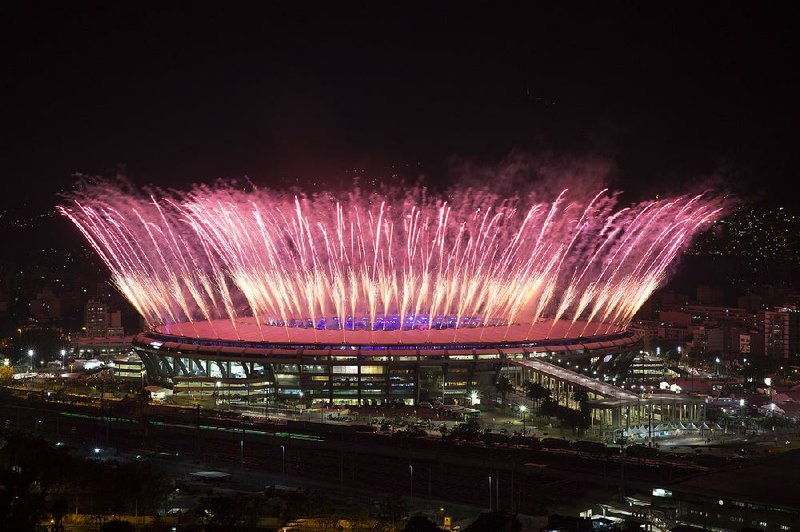RIO DE JANEIRO -- The Summer Olympic Games kicked off Friday night in an opening ceremony with a gutted budget but a soaring feel, as a stadium nestled below a hillside pulsed with lights, fireworks, circuslike acrobats and a samba singalong.
2016 Summer Olympics coverage
Arkansans in the Olympics: Stories, results + more
SCHEDULE: Interactive calendar of all events
THE TORCH: Details on this year’s torch, information on torchbearers, route of the torch relay
QUIZ: Test your Summer Olympics knowledge
RELATED ARTICLES
http://www.arkansas…">No rest not a problem for Nigeriahttp://www.arkansas…">Olympic notebook
http://www.arkansas…">Relaying a messagehttp://www.arkansas…">Zika fails to deter former Razorbacks
Brazil, the first South American country to host the Olympics, used the start of the Games to tell a version of the country's history -- from slavery to mega-cities -- that comes as hard economic times are testing its fun-loving style.
The first hour of the celebration featured a 12-year-old rapper, a supermodel and beams of light used to dazzling effect -- part of what Daniela Thomas, one of the event's co-directors, called "MacGyver" ingenuity, in reference to the stripped-down budget.
Projections of light and imagery cast the stadium floor in ethereal greens and blues, and in 30 minutes Brazil provided eons of choreographed history -- with performers sometimes taking a back seat to the visual effects. Images on the turf first showed a creation-of-Earth story -- molecules, smoke, creatures crawling from the sea. Soon, a new splash of light gave the stadium the feel of a rain forest, with the sounds of animals chirping to make the point.
The performers came in. A line of indigenous tribes making homes in the rain forest. Portuguese arriving on ships in the colonial era. Africans towed in on ships, shackled, moving through the stadium with feet secured in blocks. Then, the music quickened, and projections showed what appeared to be blocks rising from the ground. As those blocks turned into skyscrapers -- an homage to Rio's development -- a team of dancers leapt from rooftop to rooftop.
Earlier, the Brazilian singer Regina Casé, who warmed up the crowd at Maracana Stadium, told the thousands of cheering spectators: "Here in Brazil, we like to party."
A video on four jumbo screens showed a montage of Brazil's sweeping vistas -- rumbling waves, above-the-Amazon hang gliders and aerial views of the famous Christ statue in Rio de Janeiro.
Before the 206 competing nations, plus one refugee team, paraded into the stadium, Brazil showed off some of its musical riches, with a much-loved samba singer, Zeca Pagodinho. The audience sang along. This was after a dance routine featuring dancers spinning on the floor, which was based on capoeira, a Brazilian martial art, and was accompanied by Brazilian female rapper Karol Conka.
After the hour-long show, athletes paraded into the stadium -- led first, per tradition, by Greece, which hosted the initial Games. The order then proceeded alphabetically; athletes from Cameroon wore traditional flowing robes, those from communist-led Cuba had outfits designed by a French luxury footwear designer. The team from the United States -- Estados Unidos, in Portugese -- paraded in earlier than it usually does, this time wearing blue blazers and being led by swimmer Michael Phelps.
The U.S. team received a warm reception as Secretary of State John Kerry looked on from the stands.
Rio's preparations for the Games were marked by a catalogue of bad news: sluggish venue construction, rising crime and coastal waters so polluted that Olympic swimmers were advised to avoid swallowing even a few spoonfuls.
But, for one night at least, Rio de Janeiro was basking in what it does best. This is a country expert in revelry, which every year fills its streets with dancing, stranger-kissing and inebriated glee at Carnival. The drumming and samba, the feathers and sequins, the models and athletes: Brazilians have been preparing for the opening ceremony for years.
Hundreds of millions of people around the world tuned in to Maracana Stadium -- the 74,000-seat venue hosting the ceremony.
Many people had expected the Olympic flame to be lit by 75-year-old soccer legend Pelé, but he said he would not participate in the ceremony because of his health.
Coming two years after the most expensive Olympics ever -- the $50 billion Winter Games in Sochi, Russia -- Rio's welcome to the world was jubilant but restrained. This has become the austerity Olympics, with the country's economic fortunes plunging since it won the bid for the Games in 2009. Brazil is now locked in one of its worse recessions, dragged down by slumping oil prices and allegations of staggering corruption.
For the opening ceremony, the budget available was one-tenth of what London had for the 2012 Summer Olympics ceremony.
The run-up to the Games has been punctuated by demonstrations, an anti-Olympic backlash driven by people who felt the time was not right for lavish spending. Protesters blocked the torch's progress as it made its way around the country and attempted to douse it with fire extinguishers and buckets of water; in a few cases they were met by police firing tear gas and rubber bullets.
Yet it's not all recriminations and rancor in Rio and beyond.
Many Brazilians have embraced their opportunity to host the Games. Residents have lined the streets and cheered the passing torch as it has made its way into Rio.
"I think they are a wonderful thing for Rio in terms of the spirit," said Aline Campos, 45, who works in a financing company in the city's center. "It is a very beautiful coming-together of people, and people are happy they are here."
Sports on 08/06/2016

